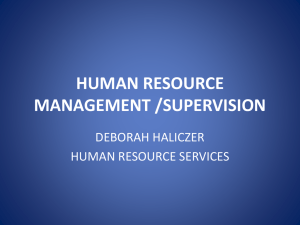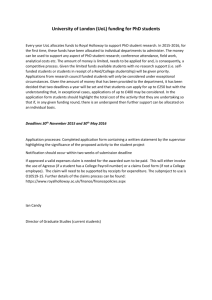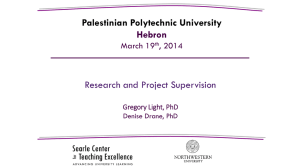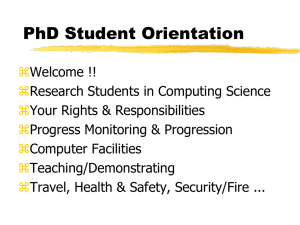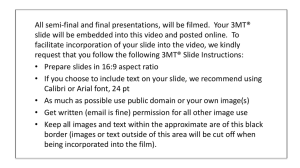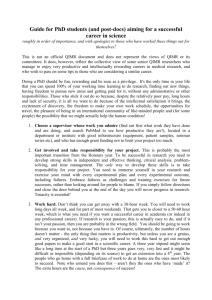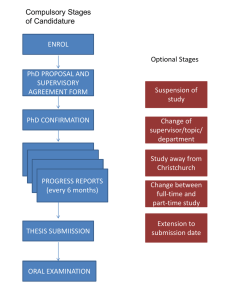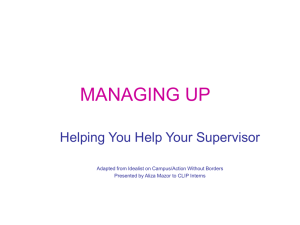PhD student`s view about PhD supervision - News
advertisement
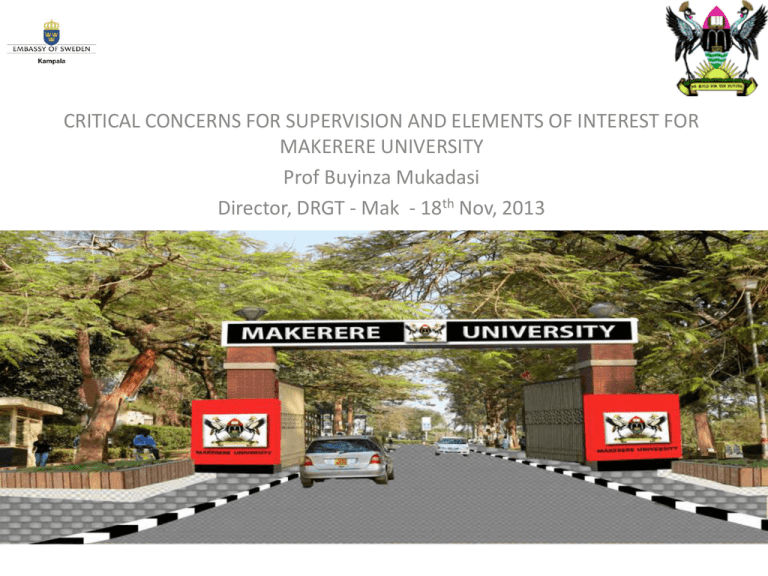
CRITICAL CONCERNS FOR SUPERVISION AND ELEMENTS OF INTEREST FOR MAKERERE UNIVERSITY Prof Buyinza Mukadasi Director, DRGT - Mak - 18th Nov, 2013 CHANGE MANAGEMENT COMMITTEE The supervisory role • • • • • • • • Assist in finding the ‘gap’ that your thesis will fill Provide a managed environment Support your research effort Broader intellectual support Writing support Facilitate closure Administrative support Personal support Its like taking off the training wheels Flying solo for the first time Complexity also arises from... • Research is a thinking process • Research is a social process • Research is discovery and so can never be repeated • Consider the names given to the academic who hosts a PG student – Supervisor – Advisor – Promoter How can the PhD experience go wrong? Selection of research topic: • Scope is too small • Scope is too large • Proposed research yields no results • Supervisor is not an expert in the field • Co-supervisors do see eye to eye The supervisor shall... • Advise the student: help find a thesis topic, teach how to do research, write papers, give talks, etc. • Provide early and clear guidance about the time frames and conditions for graduation. • Introduce the student to the academic community, through conference talks, invited talks, letters of recommendation, etc. • Proactively provide realistic, honest advice about post-Ph.D. career prospects. Supervisor’s Expectations • • • • • • Diligence Independence Reliability Creativity Dedication Contributions • Ability to – – – – – – – – Read and understand Analyse Conceptualise Think abstractly Think independently Write clearly Write concisely Spell The student shall ... • Take direction • Understand that the life of an academic is far more complicated than simply thinking new thoughts • Work hard from day one • Stay focused on the goal of the research • Stay focused on the PhD degree • Avoid the “failure to launch” syndrome Student’s expectations • Simple registration • Guidance with – Proposal writing – Experimentation – Conclusions • Access to – – – – – Equipment Laboratories Subjects Prior knowledge Networks • Safe environment – Field work • Contribution to research critical mass • Mentorship – Life lessons – Career advancement – Balance in social setting • Being held accountable – Actions – Progress – Inaction What students expect of their supervisors - I To support, encourage, guide and advise To read the work submitted to them To be friendly, open and available when needed To have good knowledge of the research area To be critical but in a constructive way To be flexible and understand what they are communicating Set aside uninterrupted time to discuss the research project What students expect of their supervisors - II Attend seminars when they are presenting their work To have sufficient interest in their research To introduce them to other researchers in the same field To be a role model in research and publications Encourage independent thinking and originality Help students with problems that may interfere with their progress Review progress reports and advise accordingly Ensure student receives appropriate research training Ensure adequate research facilities and resources Student’s roles in effective supervision - I Set timelines for the project and review them with supervisor Go for the meeting with a list of topics for discussion Ask supplementary questions Ensure that you have a date, time and place for next meeting Be meticulous in meeting appointments Ideal PhD Supervisor-Students perspective In addition to having knowledge and expertise, should be; Passionate about mentoring Has personal interest in the student welfare Ready to share professional experiences, wisdom and knowledge Appreciates that at the end of the graduate program the student will be the expert Student’s roles in effective supervision - II Be enthusiastic about your PhD work Criticism is part of the PhD experience Be clear of what is being criticized and how to put it right Never leave without fully understanding what is expected of you Avoid inappropriate personal relationships The supervisor-student dynamic shifts over the course of a degree • Early on the supervisor – hands on, doling out specific topics, helping to craft early papers • Toward the end the student – know more than the supervisor – Take the lead in the investigate • The trick is getting the timing right. After Matt Might - http://matt.might.net/articles/ways-to-fail-a-phd/ Understand the dynamic nature of supervision Rapidly becoming the world’s leading expert In the field Knowledge supervisor student Duration Supervisor-supervisee contract • • • • • Signed by both supervisor and student Signed early on in the relationship Contains an outline of expectations Explicitly ‘outlaws’ certain behaviours Explicitly encourages other behaviours It’s a two way agreement Consider the Mak Example CONTRACT OF SUPERVISION AND ACADEMIC OBLIGATIONS This document provides a guideline to communication and practice for the duration of the doctoral research between _____________________________ (PhD candidate) and _____________________________ (Supervisor) at _____________________________ (name of institution). The contract should cover ... • Research goals • For the PhD • Gantt What When Why Who • Student • Supervisor This is interesting ... What do you think is the most important component of success in the PhD student – Supervisor relationship? Communication? Hard work? Transparency? A =1, B = 2, C = 3, D = 4, E = 5, F = 6, G = 7, H = 8, I = 9, J = 10, K = 11, L = 12, M = 13, N = 14, O = 15, P = 16, Q = 17, R = 18, S = 19, T = 20, U = 21, V = 22, W = 23, X = 24, Y = 25, Z = 26 Conclusion Supervisor-student relationship is very important in the PhD process, delicate and complex Should be structured, with regular recorded meetings Requires mutual respect, openness and honest debates Effective supervision is a two-way process ETHICS = Science formula applies: Your “ETHICS” must be as good as your “Science” Nobody can effectively multi-task (job, research, Let us see the process differently

